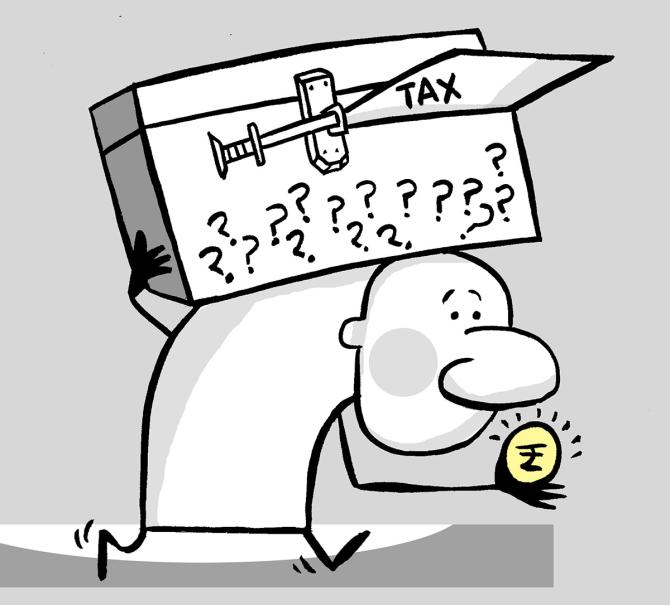The Union government is projected to share about 32 per cent of central taxes with states during the financial year 2024-25 against the 15th Finance Commission’s recommendation of 41 per cent.

The Revised Estimates (RE) for FY24, too, show a similar share of states in the central taxes at 32 per cent.
In absolute terms, however, there has been an increase in the amount devolved to states compared to the Budget Estimates (BE) for FY24 at Rs 11 trillion.
The BE for FY25 has pegged states' share at Rs 12.2 trillion, which is an increase of over 10.4 per cent to the amount devolved, according to the RE for FY24.
The final report of the 15th Finance Commission had recommended the transfer of 41 per cent to the states after Jammu and Kashmir was carved out into two union territories.
Prior to this, the 14th Finance Commission had recommended the devolution of 42 per cent of central taxes to states.
The states’ share, however, has been lower due to cess and surcharge imposed by the Centre, which are not shared with states.
States have often complained about lesser devolution compared to the recommendations of the finance commission.
Aditi Nayar, chief economist at ICRA, said, “The FY24 RE has indicated a higher amount of central tax devolution compared to the BE as well as our estimate.
"This implies that Rs 3.6 trillion is left to be released in Q4 FY24.
"This is 5 per cent higher than Q4 FY23, which we believe provides a further downside to state government securities issuance in the current quarter.”
Finance Minister Nirmala Sitharaman, in her interim Budget speech, has announced that the scheme of 50-year interest free loan for capital expenditure to states would be continued in FY25 with total outlay unchanged at Rs 1.3 trillion.
Sitharaman also announced a provision of Rs 75,000 crore as 50-year interest free loan for FY25 to support milestone-linked reforms by state governments.
“Many growth and development enabling reforms are needed in the states for realising the vision of Viksit Bharat,” she said in her Budget speech.
Finance secretary TV Somanathan, however, clarified in the post-Budget press conference that the Rs 75,000-crore loan is part of the overall outlay for interest free loans for states.
Sitharaman said that guided by the principle “Reform, Perform and Transform”, the government will take up next generation reforms and build consensus with the states and stakeholders for effective implementation.
One of the key pending reforms is introduction of labour codes despite approval by the majority of states.
The labour codes consolidate 29 complex laws into four codes.
These are the codes on wages, industrial relations, occupational safety and social security.
Labour reforms are keenly watched by India Inc but trade unions have to be taken on board by the Centre and states.
The Centre would transfer other funds to states through various centrally-sponsored schemes such as Mahatma Gandhi National Rural Employment Guarantee Scheme (MGNREGS), Jal Jeevan Mission and others.
The transfer to states for centrally-sponsored schemes in FY25 is around Rs 5 trillion, which is a decline of 9 per cent over the RE for FY 24.
The FY24 RE for transfers under centrally-sponsored schemes is also marginally lower at Rs 4.6 trillion compared to the BE of Rs 4.76 trillion.
Grants-in-aid for creation of capital account for FY25 have increased by 20 per cent to Rs 3.9 trillion compared to the revised estimate of Rs 3.2 trillion in FY24.
The revised estimate for FY24, however, has shown a decline of 13 per cent over the BE for the year.
“An indicator of devolution of central taxes to the states is the excess of Centre’s gross taxes over its net taxes relative to GDP.
"This excess in FY24 (RE) and FY25 (BE) amounts to 3.75 per cent,” said DK Srivastava, chief policy advisor, EY India.
“As such, there is no effective increase in the share of tax revenues transferred to the states.
"However, the expectation is that the calendar of release of state’s share in central taxes in FY25 would be maintained in a manner similar to FY24.
"This has been helpful for the states as it has enabled them to realise their share in central taxes in a timely way.
"Therefore, they could spend it by frontloading capital expenditures.
"States’ capital expenditures were also facilitated by the 50-year interest free loans extended to them by the Centre.
"This scheme has also been extended for one more year.
"We expect the states to complement the Centre’s efforts for supporting domestic demand through capital expenditures,” he added.











